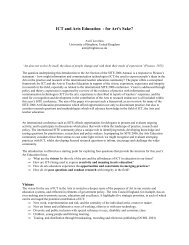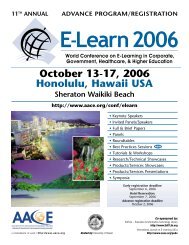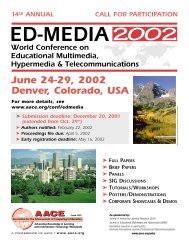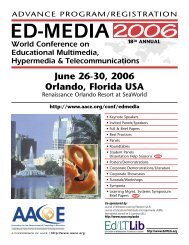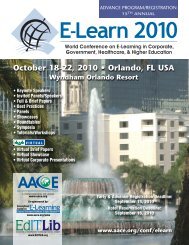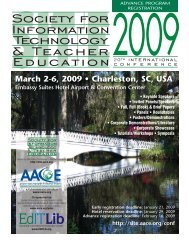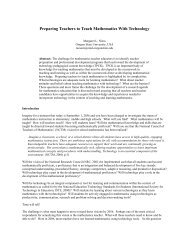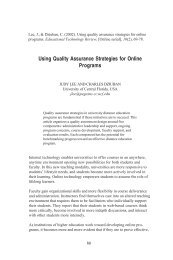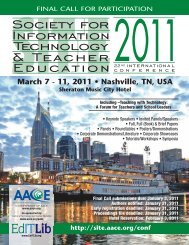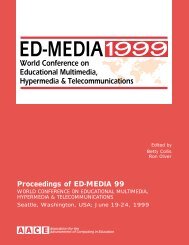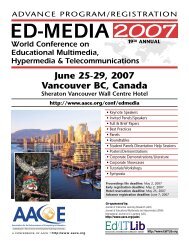ED-MEDIA 1999 Proceedings Book - Association for the ...
ED-MEDIA 1999 Proceedings Book - Association for the ...
ED-MEDIA 1999 Proceedings Book - Association for the ...
You also want an ePaper? Increase the reach of your titles
YUMPU automatically turns print PDFs into web optimized ePapers that Google loves.
Issues In The Design, Development And Implementation Of An<br />
Alternative Delivery Format Master's Degree In Instructional<br />
Technology<br />
Michael Szabo, Ph.D., Forum Organizer, University of Alberta<br />
mike.szab@ualberta.ca<br />
Craig Montgomerie, Ph.D., University of Alberta<br />
craig.montgomerie@ualberta.ca<br />
David Mappin, Ph.D., University of Alberta<br />
david.mappin@ualberta.ca<br />
Annette Fuchs, M.Ed., University of Alberta<br />
<br />
Edmonton, AB Canada<br />
Overview<br />
The purpose of this <strong>for</strong>um is to describe <strong>the</strong> process, issues and some solutions encountered in<br />
converting a university-based Masters Degree in Instructional Technology to an alternate delivery <strong>for</strong>mat<br />
(ADF). Beginning in 1994, courses in this degree program have been converted to one or more ADFs. By<br />
<strong>the</strong> summer of <strong>1999</strong>, <strong>the</strong> core courses in <strong>the</strong> program will be available in ADF <strong>for</strong>mat and have been piloted<br />
at least once.<br />
The team involved in <strong>the</strong> conversion has wrestled with numerous issues that will be discussed during<br />
<strong>the</strong> <strong>for</strong>um. Some of <strong>the</strong> issues are:<br />
• What are ADFs and which are useful <strong>for</strong> our purpose<br />
• To what extent should <strong>the</strong> entirety of <strong>the</strong> courses be placed in ADF<br />
• How do we deal with conveying expert's knowledge via ADF<br />
• How do students obtain access to <strong>the</strong> resources needed to complete <strong>the</strong> courses<br />
• What data should be tracked and how will it be tracked<br />
• What issues arise from building a non-conventional degree in a conventional, research-oriented<br />
university<br />
• What is <strong>the</strong> reaction of students, who are by and large majoring in instructional technology<br />
• How does one build an infrastructure to promote ADF courses and degrees<br />
• What is <strong>the</strong> role of face to face (F2F) instruction in ADF<br />
• What is <strong>the</strong> return on investment on course development <strong>for</strong> ADF<br />
• What skills are crucial to successful development What is <strong>the</strong> role of a design team<br />
It is expected that o<strong>the</strong>rs at <strong>ED</strong>M<strong>ED</strong>IA 99 are grappling with similar issues and would appreciate<br />
hearing how one institution deals with <strong>the</strong>m, discussing <strong>the</strong>ir particular situation with respect to ADFs,<br />
providing feedback to <strong>the</strong> <strong>for</strong>um leaders and networking with o<strong>the</strong>rs at <strong>the</strong> conference about <strong>the</strong>se issues.<br />
Background<br />
The University of Alberta has been a leader in <strong>the</strong> field of Computer-Based Instruction since it acquired an<br />
IBM 1500 System in <strong>the</strong> middle 1960s. The leadership continued when <strong>the</strong> 1500 system was replaced by a<br />
PLATO system, later to be replaced by micros, videodisc, CDs, LANs, WANs, <strong>the</strong> Internet and most<br />
recently <strong>the</strong> WWW. Many of <strong>the</strong> faculty members who participated in <strong>the</strong>se early systems now <strong>for</strong>m <strong>the</strong><br />
core of <strong>the</strong> graduate program in Instructional Technology (IT).<br />
Throughout that period, extensive research and development on many phases of CBI were carried out.<br />
This work could not have been done without <strong>the</strong> extensive participation of graduate students, many of<br />
whom have continued and excelled in <strong>the</strong> field (e.g., Donald Tapscott, M.Ed. 1978; Greg Kearsley, Ph.D.<br />
1978). In<strong>for</strong>mal masters and doctoral degree programs arose within <strong>the</strong> Department of Educational<br />
Psychology to accommodate <strong>the</strong>se students.



